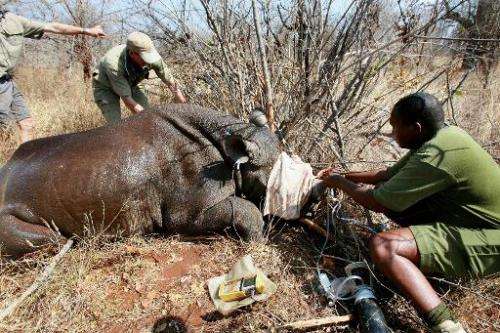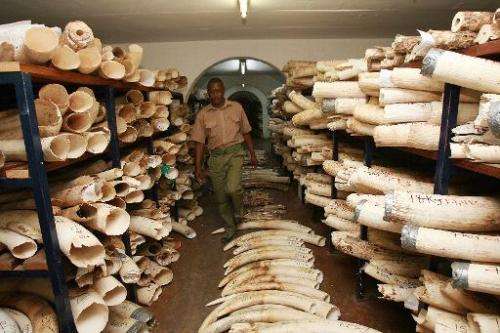Zimbabwe rhino poaching drops in 2013, 750 animals remain

The number of rhinos poached in Zimbabwe dropped sharply last year but decades of illegal killing have decimated the population and only 750 remain, a senior wildlife official said on Tuesday.
Poachers killed 20 rhinos in the country in 2013, a drop of 66 percent compared with the previous year, the director of the Zimbabwe Parks and Wildlife Authority told AFP on the sidelines of a rhino conservation meeting.
This compared with 60 killed in 2013 and 84 slaughtered in the peak poaching year of 2008, said Geoffreys Matipano.
But poaching has decimated the country's rhino population over the past two decades.
"In the late 1980s we had close to 2,000 rhinos and then they (numbers) crashed," he said.
There remain only 750—450 black and 300 white rhinos—in the country's national parks and private game reserves, he said.
On Monday the authority's director-general Edson Chidziya told lawmakers that most of the rhino deaths were blamed on poaching by locals.
But while poaching seemed to be on the decline in Zimbabwe, it was on the rise in neighbouring South Africa, home to the majority of the world's rhino population.
More than 1,000 rhinos were illegally killed last year in South Africa, home to an estimated 25,000 rhinos, a 50 percent jump from the previous year.

Poaching of rhinos is being fuelled by rising demand for rhino horn from Asia.
Rhino horns are prized as a status symbol in Asia and mistakenly thought to possess medicinal properties.
Zimbabwean authorities and conservation experts have adopted a raft of measures including jails terms for convicted poachers.
They have also taken to dehorning the animals, satellite tracking and relocation of rhinos from high threat areas to more secure sanctuaries.
Chidziya said the poachers often shoot the animals, but some have resorted to poisoning them.
A wildlife conservation group reported last year that more than 300 elephants and other animals died due to cyanide poisoning by poachers in Zimbabwe's largest game park in Hwange.
© 2014 AFP





















